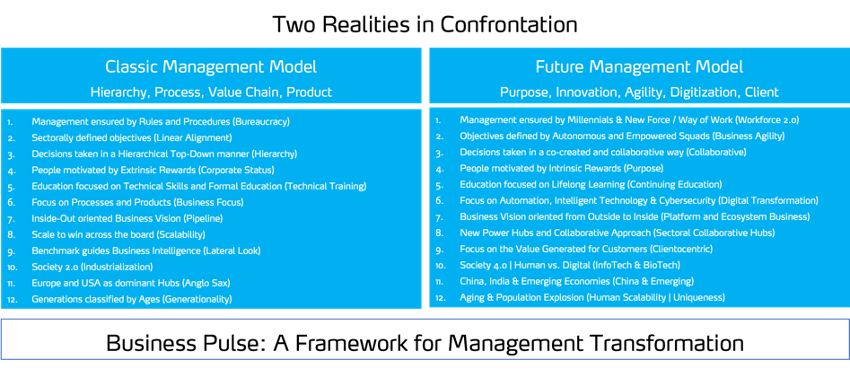
HOW TO APPLY TRENDS IN STRATEGIC COMMUNICATION
March 5, 2021
THE SEX WORK REVOLUTION
March 10, 2021Business has changed. Why hasn’t management done it yet?
The management of companies has, until today, been influenced by the management principles created in the 2nd Industrial Revolution, principles based on mass production, which is achieved thanks to the concept of division of tasks and the use of electric energy. The first known example was that of the first conveyor belt at a slaughterhouse in Cincinnati, in 1870. Since that time, the rules of operation of companies (with normal adjustments) have not been subject to major questions or significant changes while remaining true to Taylor, Fayol and Ford.
For two centuries, management has been based on the hierarchy of decisions and functions, with a high focus on the value chain and maximum attention to the product, in a clear vision built “from the inside out”. Despite the different changes that the world has been experiencing, namely at the beginning of the 21st century, companies have resisted changing their way of acting and thinking. Mental models cast in the past and cultural beliefs of the last century have blocked the evolution and transformation of business, condemning companies around the world. The time has come to change that reality.
Identified in 2016 by the WEF (World Economic Forum), the 4th Industrial Revolution arrived to change everything. Based on the use of cyber physical systems (CPS), beginning the era of connected industry and smart factories. This new reality has been expanding and widening to society and the world with the growing influence of technology and connectivity. This growing behavioral phenomenon has significantly altered consumer behavior and market dynamics. So-called traditional companies have lost ground to new entrants, many of whom are representatives of the start-up movement, which have been changing the management modus operandi and business dynamics. A new management model emerges focused on new rules and supported by new operating variables, orienting the look to the customer, using the emerging approaches of innovation, digitalization and agility.
The time has come for change. Whoever does not adopt a new way of acting, a new model of managing their business, will have great difficulties in survival in the next decade and in the future.
The transition from management models (from Classic to the Future) requires a journey of deep transformation that works from end to end in the company, redesigning and redefining all the rules and ways of acting hitherto practiced.
Business Pulse is a new approach to the business management model, aligned with the current transformation context and with a vision oriented to the future. A profound transformation of companies that want to progress and succeed in the 4th industrial revolution. It serves to help companies design, develop and implement the new model of global transformation through work sessions with senior management for audit, decision, construction and implementation of the 12 variables of the management transformation framework that we call Business Pulse illustrated in table below.

Supported by 12 major strategic axes of change, the journey of transformation of management takes the name of Business Pulse. The need for a new pulse, a new energy, is what will make companies follow the path of success.




